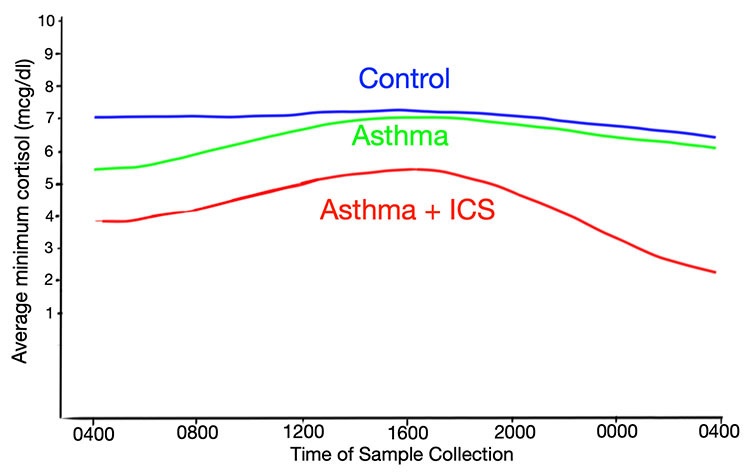Highlights This study identified and analyzed metabolites associated with asthma using four distinct cohorts comprising more than 14,000 patients . Patients with asthma were found to have significantly reduced levels of endogenous steroids, such as cortisol and DHEA-S, which were further reduced in a dose-dependent manner among patients using inhaled corticosteroids (ICS).
After leveraging a large data set and using a novel metabolomic approach, this study provides the strongest evidence for the adverse effects of ICS on the adrenal glands, with previous smaller studies finding mixed results. The authors suggest that routine cortisol monitoring may be warranted for patients with asthma using ICS to guide understanding of the risks and benefits of medications. |
Summary
The application of large-scale metabolomic profiling provides new opportunities to realize the potential of omics-based precision medicine for asthma. Leveraging data from more than 14,000 people in four distinct cohorts, this study independently identifies and replicates 17 steroid metabolites whose levels were significantly reduced in people with prevalent asthma.
Although steroid levels were reduced in all asthma cases, regardless of medication use, the greatest reductions were associated with inhaled corticosteroid (ICS) treatment, as confirmed in a 4-year low-dose ICS clinical trial .
The effects of ICS treatment on steroid levels were dose dependent ; however, significant reductions also occurred with low-dose ICS treatment.
Using data from electronic medical records, we found that cortisol levels were substantially reduced over the entire 24-hour daily period in patients with asthma treated with ICS compared to those not treated and patients without asthma.
Additionally, patients with asthma who were treated with ICS showed significant increases in fatigue and anemia compared to those not treated with ICS.
Therefore, adrenal suppression in asthma patients treated with ICS may represent a larger public health problem than previously recognized. Regular cortisol monitoring of asthma patients treated with ICS is necessary to provide the optimal balance between minimizing the adverse effects of adrenal suppression and taking advantage of the established benefits of ICS treatment.

Comments
Inhaled corticosteroids and adrenal suppression
Inhaled corticosteroids (ICS) are a reliable and effective drug for the treatment of lung inflammation. The GINA guidelines updated in 2021 moved ICS up the recommendations for rescue therapy ahead of short-acting beta-agonists. This is the largest sample size to date evaluating four cohorts of over 10,000 subjects to evaluate adrenal hormones in asthmatics who were treated with and without ICS.
Key findings:
- Overall, asthmatics were found to have lower levels of 17 endogenous steroid metabolites, including DHEA and cortisol. This finding suggests that low levels of these steroids may make a person more prone to asthma.
- The degree of adrenal suppression was directly correlated with the ICS dose.
- Adrenal suppression was observed even with low doses of ICS.
What does this mean clinically?
This study did not examine the long-term consequences of adrenal suppression by ICS, which are not yet fully understood. The doctor will have to weigh the harms and benefits of using ICS. The authors suggest using the lowest and most effective dose .
Previous research has shown that for 500 ug of ICS daily, most of the benefit occurs after the first 100 to 125 ug. Using the lowest possible dose is particularly important for prepubertal pediatric asthmatics.
This study also showed that asthmatics have low levels of morning cortisol compared to controls.
The authors suggest checking cortisol levels at 8 a.m. before prescribing an ICS.















